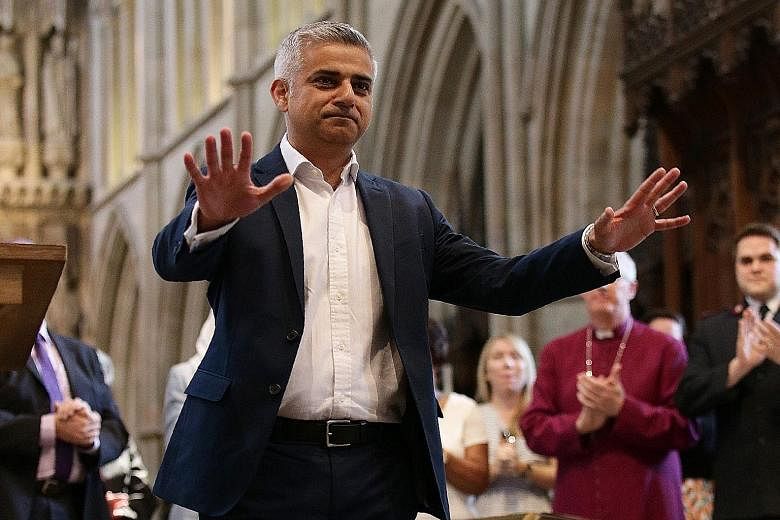Local elections in Britain are often dismissed as a sideshow, political confrontations between little- known people with nothing much at stake.
Not last week, however, for Britain's "Super Thursday" marathon electoral round decided not only the fate of 2,700 municipal officials but also the shape of the government in Scotland, and also picked the next mayor of London.
And with most of the ballots now counted, it's clear that all of the parties suffered a drubbing, with the opposition Labour the worst off.
The largest showdown and biggest electoral upsets were in Scotland, where the Scottish National Party (SNP), a separatist movement pledged to the province's eventual independence from the United Kingdom, appeared certain to secure its third consecutive win. It did, although the 4.2 million-strong Scottish electorate astonished opinion pollsters by depriving the SNP of its overall majority: the Scottish nationalists won only 63 out of 129 seats in Scotland's regional Parliament, far fewer than they anticipated.
And in a stinging rebuke to Labour's far-left leader Jeremy Corbyn, who was assumed to be more appealing to Scotland's left-leaning electorate, the party captured only 24 seats, 13 fewer than in the outgoing Scottish legislature. This is Labour's worst electoral result since 1928.
 London's incoming mayor Sadiq Khan, who was the Labour candidate, at his swearing-in ceremony yesterday. His win was the sole consolation for the opposition party. PHOTO: AGENCE FRANCE-PRESSE
London's incoming mayor Sadiq Khan, who was the Labour candidate, at his swearing-in ceremony yesterday. His win was the sole consolation for the opposition party. PHOTO: AGENCE FRANCE-PRESSE And to add insult to injury, the Conservatives, who control the British government but who until recently were dismissed as irrelevant in Scotland, have now replaced Labour as the second-largest party in the province, capturing 31 seats.
That feat is almost entirely due to Ms Ruth Davidson, the feisty 37-year-old Scottish Conservative leader, an openly gay politician who, borrowing from her hobby of kick-boxing, ran a clever campaign and is now one of Britain's most popular politicians.
Ms Davidson claims to be "under no illusion" that she has converted Scotland into a Conservative- voting province. "The people have elected us to do a very specific job, and that is to hold the Scottish nationalists to account," she said after ballots were counted.
Still, the win could turn out to have profound and long-term implications, for if she consolidates the Conservatives' hold as the true opposition to the SNP, she may deprive Labour of any chance of returning to power at the national level, for Labour cannot form any British government without Scottish voters.
Labour also did badly in Wales' elections, and in England, where for the first time since the 1980s, it failed to increase its share of the vote while in opposition.
Labour's only consolation is the election of its candidate Sadiq Khan as the mayor of London. After one of the most bitterly fought elections in recent decades, Mr Khan, the son of a bus driver of Pakistani descent, gained the support of more than 1.1 million voters in London, trouncing Mr Zac Goldsmith, his Conservative opponent, the son of a billionaire of Jewish origins.
Both men vowed that race and religion wouldn't be part of their campaigns, and both failed to keep their promises. Mr Khan often played on his rags-to-riches personal story, and on the claim that Britain may be the only European nation where a Muslim can rise to prominence.
Meanwhile, Mr Goldsmith and British Prime Minister David Cameron accused Mr Khan of "sharing platforms" with "those holding extremist views", or with "sympathisers for terrorism".
In the event, Mr Khan triumphed by securing 44.2 per cent of the votes. Since only 14 per cent of London's electorate is Muslim, the result showed his appeal cut across both ethnic and religious lines.
The fact that the EU's biggest capital city will be governed by a Muslim is already touted by British diplomats and politicians as an example of their country's diversity and toleration. "Across and above politics, whatever your background, gender, race or religion, this is possible in the UK," read an enthusiastic Tweet from Ms Vicki Treadell, the British High Commissioner to Malaysia.
Perhaps, although reconciliation is not the preferred term in British politics this weekend. Mr Cameron has refused to withdraw his criticism of Mr Khan, suggesting that his ruling Conservatives remain determined to undermine the London mayor.
"We don't back away from the questions we raised during the campaign," a source close to the Prime Minister told the local media. Meanwhile, Labour MPs, aghast at the disastrous electoral performance of their leader, Mr Corbyn, are renewing their campaign to unseat him.
British politics have seldom been in such a bickering mood. And a far bigger challenge beckons next month when the country has to vote in a crucial referendum on whether it will remain in the EU.


